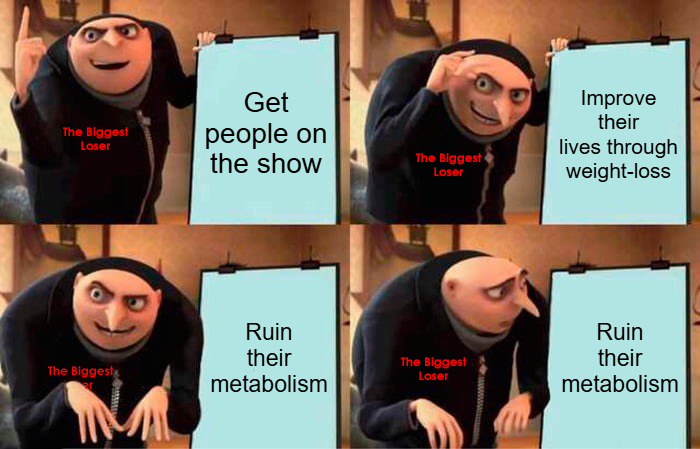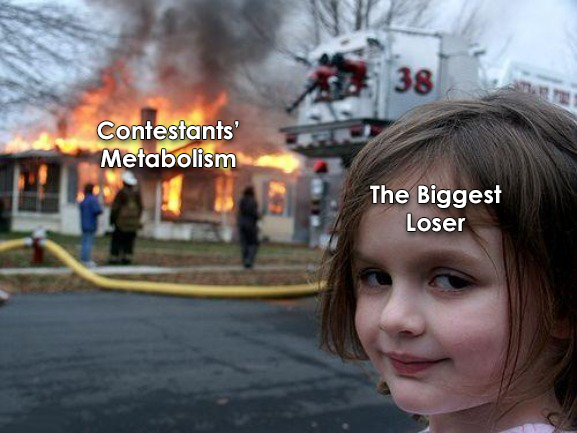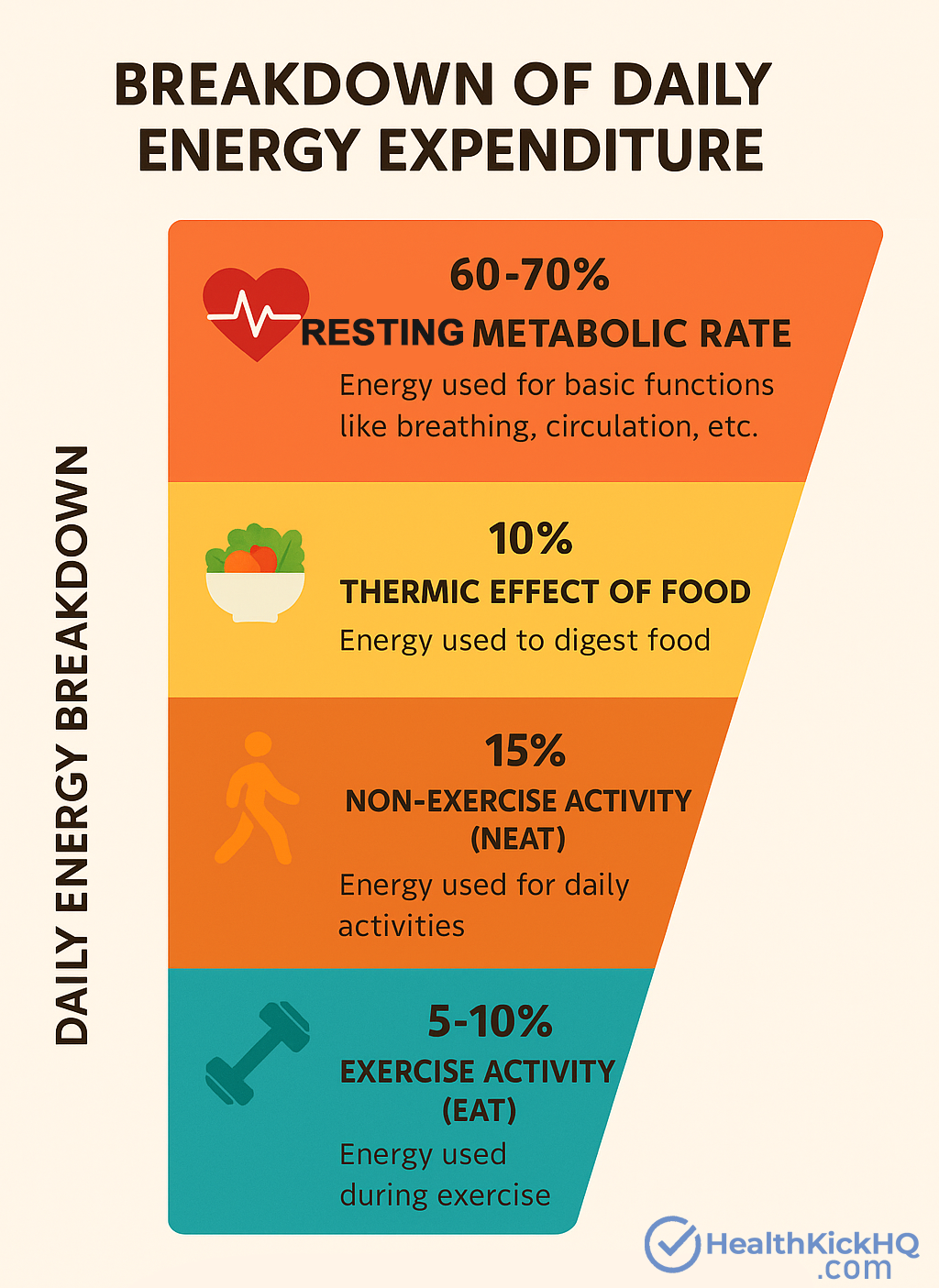
Did “the Biggest Loser” ruin the metabolic rate of its contestants?

No—the Biggest Loser didn’t “ruin” contestants’ metabolism.
But if you’ve watched the new Netflix documentary “Fit for TV”, you might think it did.
An NIH study tracked 14 former contestants for 6 years and found their resting metabolic rates (RMR) were lower than peers of the same age, gender, and weight. The documentary claims this rapid weight loss caused permanent metabolic damage—suggesting former contestants must eat less than others to maintain their weight.
But that’s complete bunk. It’s misinterpreting the study, the data, and what Kevin D. Hall, one of the authors of the study, said about it.
Here’s why it’s wrong.
First, you have to understand how your metabolism works, especially during weight-loss.
It starts with your Resting Metabolic Rate (RMR), which is how many calories your body burns at rest.
In general:
-
- If you’re a larger person, your body has more mass to maintain, so you burn more calories at rest. This means you have a higher RMR.
- If you’re a smaller person, your body burns fewer calories at rest, so you have a lower RMR.
(RMR calculators can help you estimate what your personal RMR is).
When you lose weight, your RMR drops because you become a smaller person. People often attribute your lower RMR to issues with weight loss. But biggest reason your RMR is lower is because your body has less mass to maintain.
However, the data tells us the drop in your RMR often slightly exceeds someone who never lost the weight. Put simply:
-
- Person A – Was always 200 lbs. RMR is 1880 calories/day, meaning his body burns 1880 calories a day at rest.
- Person B – Was 300 lbs, but lost 100 lbs. Their RMR at 200 lbs is 1850 calories a day, 30 calories lower than person A.
This is why metabolic adaptation is overstated in weight-loss. On average, the largest difference between someone at a constant weight and someone who dropped pounds to get to the same weight is 3-5%. (source) In the above example, that comes out to about a ~50 calorie difference— which is not significant enough to make a major difference.
Okay, but why do their RMRs drop in the first place?
Why Your RMR Drops Below Expected Amounts After Weight Loss
 The internet is full of false information on this. You’ve probably heard losing weight is “harder” the second time because you’ve “wrecked” your metabolism, or some other nonsense.
The internet is full of false information on this. You’ve probably heard losing weight is “harder” the second time because you’ve “wrecked” your metabolism, or some other nonsense.
Many repeat the debunked “starvation mode” lie over and over again. Their starvation is for clicks, not for truth.
Starvation mode isn’t real. Your body’s metabolism isn’t “wrecked” by weight loss. Losing weight is good for you (if you’re overweight), don’t listen to the fearmongers.
But again, this begs the question: why is your RMR slightly lower after you lose weight than someone who is at the same weight and never lost weight?
There are a few possible explanations.
- Body Composition – As you lose weight, you drop fat, but you also lose some muscle. Different strategies can help mitigate that (like high-protein diets and weight lifting), but you will likely lose muscle as you lose weight. Your body burns more calories maintaining muscle than fat. So, if you have less muscle after weight loss, then your RMR would naturally be lower (3-5% feels reasonable).
-
- If this is the case, it’s not a huge deal. Re-build muscle and your RMR bounces back.
2. Genetic Differences – Your genes don’t give you an excuse to be skinny or fat. Much of the obesity that runs in families has more to do with behavior than genetics. However: the twin study proved that there is at least some genetic differences in peoples’ RMRs, even if it’s only ~10-100 calories. So, your RMR will vary somewhat due to your genes. Since the RMR difference after losing weight is only 3-5% away from the expected number, this could account for some of it.
-
- This means that people were more likely to BECOME obese because they had slightly lower RMRs to begin with. It’s not that their RMR dropped after weight-loss, it’s that they had lower RMRs, then lost weight.
It’s probably a combination of those two factors, and there are likely other lurking variables. But if you are obese: you have to understand (1) You can still choose to be a different body size, you’re not constrained by your genes. And (2) if you lose weight, you aren’t “wrecking your metabolism.”
Your RMR dropping is mostly corresponding with your change in body size & composition. It does NOT mean you’ve wrecked your metabolism. AND: It can return to normal ranges as you build muscle. Also: the difference is SO SMALL (3-5%) that it’s negligible and overstated.
The Biggest Loser Study
This study was scary.
They found 14 contestants had lowered their RMR by losing weight during the biggest loser. That’s to be expected, they became smaller people, so their RMR was lower than it was when they were bigger people.
However, they restudied these contestants 6 years later. 13 of the 14 had regained a lot of weight (though not back to their base, for most of them). What was scary: their RMRs did NOT rebound to what they were expected to be for someone with a higher weight.
This is made everyone panic. Does that mean something to do with the way they lost their weight permanently wrecked their metabolism? Is weight gain after weight-loss inevitable? Are you doomed to be fat anyway and by losing weight you just ruin your metabolism?
Well, if you watched the Netflix documentary, you’d think that was true. One of the members of that study bemoaned the fact that he had regained weight.
“So I have to eat 800 fewer calories than someone who didn’t lose weight like you do on the Biggest Loser?” He was frustrated because he assumed his RMR was much lower due to the weight-loss methods on the Biggest Loser. That’s how he interpreted the study.
Well, it’s not true. Kevin D. Hall, one of the authors of the original study, has already come out to dispute these claims. Hall said the interpretation of permanent metabolic damage to these contestants wasn’t accurate. I’ll summarize what he said below, but here’s the link to where he tries to clear this up.
What he said is these contestants had maintained an increased exercise regiment. Meaning they exercised more in the 6 years following the show than expected. This is actually a good thing, but it does lower your RMR slightly.
To help explain this, you have to know the difference between TDEE and RMR
- RMR – The number of calories your body burns a day at rest
- TDEE – Total daily energy expenditure. Or simply: the number of calories your body burns in a full day, including RMR, non-exercise activity, exercise activity, and the calories your body burns digesting food.
 When you increase your exercise, your TDEE goes up. Meaning: you burn more total calories in a day as you exercise more.
When you increase your exercise, your TDEE goes up. Meaning: you burn more total calories in a day as you exercise more.
As you exercise more, for whatever reason, your RMR drops slightly. I’ll say it again so it’s clear: Your RMR goes down slightly as you exercise, but you still burn more total calories in a day with exercise than a day without exercise. It’s just burned in a different way.
According to the author of this study, THAT is what’s causing the 14 contestants to have lower RMRs. They all continued to exercise frequently after being on the Biggest Loser, and good news: It meant their TDEE was still higher than someone at their bigger sizes. BUT: Their RMR was a touch lower.
No, the Biggest Loser did NOT wreck their metabolism. Their body was just reacting to their activity level.
Conclusion:
No, losing weight doesn’t “wreck your metabolism.” For the most part, your body burns fewer calories a day after weight-loss because you’re a smaller person. A 200 lb person has less mass to maintain than a 300 lb person, so the body burns fewer calories maintaining it.
I don’t love the Biggest Loser. Screaming at people to work out harder is not how you lose weight (it’s more about diet than exercise). Voting people off because they didn’t lose enough pounds in a week isn’t conducive to a healthy weight-loss environment. Weight loss should feel supportive, loving, and FUN! Not cutthroat zero-sum games.
Even though I don’t love the style, the Biggest Loser did NOT wreck contestants’ metabolism. Weight loss does NOT wreck your metabolism. It’s good for you (if you’re overweight).

Don’t think you’re trapped into being obese because of your genetics. That’s not how it works. Consume fewer calories than you burn in a day, you’ll lose weight. If you’re overweight or obese: Don’t feel shame! The availability of highly-processed foods in the US make it easy to be overweight. As you consume highly processed foods, your body doesn’t get the nutrients it needs. So it naturally craves more food. It makes it very easy to overconsume… not to mention the food is delicious (that’s why the majority of Americans are either overweight or obese).
But: if you’re overweight or obese, it’s not because of your genes, it’s because you consumed more calories than you burned over a long period of time. That’s the hard truth. It’s not your genetics, it’s not your mom’s fault, it’s your food and consumption choices.
But the good news: you can lose weight by lowering your daily calorie intake. And: it won’t wreck your metabolism.
You’ll look better, feel better, and live longer. It’s worth every step. I highly recommend weight loss to anyone who is overweight. It’s doable, and it’s worth it.
How do you do it?
Well, I lost over 100 pounds in a year and have kept it off for over 5 years. People kept asking me how I did it, so I built this website to explain. I even made a free weight-loss guide.
Check out our free comprehensive weight-loss guide. Or sign up for my personal coaching. I promise you won’t regret it.
Now get losing, and change your life for the better! You’re worth it.
